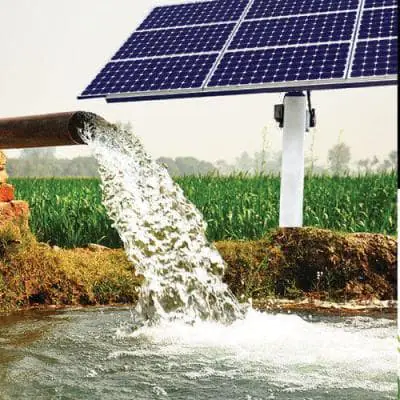
Solar water pumps are innovative devices that harness the power of the sun to pump water for various applications, including irrigation, livestock watering, and domestic water supply. These pumps offer a sustainable and environmentally friendly alternative to traditional diesel or electric pumps, providing reliable water access in remote areas or locations without access to the traditional power grid.
How Solar Water Pumps Work:
Solar water pumps operate using photovoltaic (PV) panels, which capture sunlight and convert it into electricity. This electricity is then used to power a pump that draws water from a water source, such as a well, borehole, or surface water body. The pump then delivers the water to where it is needed, such as fields for irrigation or storage tanks for domestic use.
Advantages of Solar Water Pumps:
- Energy Efficiency: Solar water pumps are highly energy-efficient, as they operate using renewable solar energy. This reduces reliance on fossil fuels and helps to mitigate greenhouse gas emissions and air pollution.
- Cost Savings: Once installed, solar water pumps have minimal operating costs, as they do not require fuel or electricity from the grid. This can result in significant cost savings for farmers, ranchers, and other users, particularly in remote or off-grid locations.
- Reliability: Solar water pumps are reliable and durable, with fewer moving parts compared to traditional pumps. This results in reduced maintenance requirements and fewer breakdowns, ensuring a consistent and reliable water supply.
- Scalability: Solar water pumps are available in a range of sizes and capacities to meet the specific needs of users. Whether for small-scale irrigation or large-scale agricultural projects, solar water pumps can be tailored to suit the requirements of any application.
- Environmental Benefits: Solar water pumps offer significant environmental benefits, including reduced water usage, preservation of natural resources, and protection of ecosystems. By harnessing solar energy instead of relying on fossil fuels, solar water pumps help to conserve energy and reduce carbon emissions.
Applications of Solar Water Pumps:
Solar water pumps are used in a variety of applications, including:
- Agricultural Irrigation: Solar water pumps are commonly used for irrigation in agriculture, providing a reliable water supply for crops without the need for grid electricity or fossil fuels.
- Livestock Watering: Solar water pumps are used to provide water for livestock, ensuring that animals have access to clean and reliable water sources even in remote or off-grid locations.
- Domestic Water Supply: Solar water pumps can be used to supply water for domestic use, such as drinking water, bathing, and household chores, particularly in areas where access to clean water is limited.
- Watering for Horticulture: Solar water pumps are also used in horticulture for watering plants in nurseries, gardens, and greenhouses, providing a sustainable and efficient water supply for plant growth.
In conclusion, solar water pumps offer a sustainable, cost-effective, and reliable solution for pumping water in various applications. With their energy efficiency, cost savings, reliability, and environmental benefits, solar water pumps are helping to improve water access and promote sustainable development around the world. As the demand for clean and renewable energy solutions continues to grow, solar water pumps will play an increasingly important role in meeting the water needs of communities, agriculture, and industry.